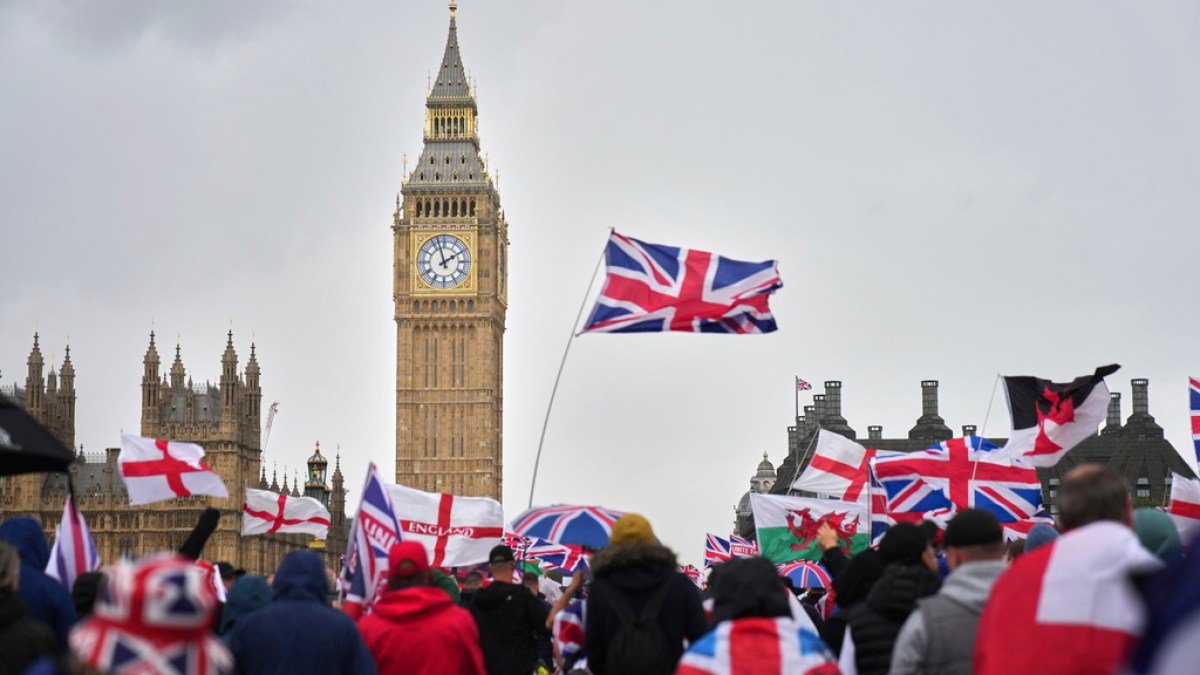Thousands Rally in London: A Clashing Tapestry of Free Speech and Anti-Racism
On a bustling Saturday in London, a march led by far-right activist Tommy Robinson, co-founder of the English Defence League (EDL), drew enormous crowds amid heightened political tensions. Rallying under the banner of “Unite the Kingdom,” the event attracted around 110,000 participants, as estimated by the Metropolitan Police, with marchers converging from Waterloo Bridge and Lambeth Bridge towards the iconic Whitehall, close to the UK Parliament.
The backdrop of this demonstration reflects a surge in support for the anti-immigrant Reform UK party, which has emerged as a significant political entity in the UK landscape. Spectators waved a kaleidoscope of flags, including the Union Jack and the Israeli Star of David, while echoing chants aimed at Labour leader Keir Starmer, amidst prominent speeches from Robinson, Katie Hopkins, and former Trump advisor Steve Bannon.
Claiming to advocate for free speech and British heritage, Robinson, whose real name is Stephen Yaxley-Lennon, accused the legal system of favoring migrants over “British citizens, the ones who built this nation.” His rally became a flashpoint for tensions, with police deploying over 1,600 officers to maintain order and keep Robinson’s supporters apart from a counter-protest organized by the “Stand Up to Racism” campaign, which attracted around 5,000 attendees.
Despite police efforts, tensions escalated as some law enforcement officers reported being assaulted while trying to enforce barriers separating the two groups. “We continue to see significant aggression directed at officers by Unite the Kingdom protesters,” the Metropolitan Police noted on social media, confirming nine arrests and additional officer presence in critical areas.
The counterprotestors, including notable left-wing figures such as Zarah Sultana and Diane Abbott, brandished signs with messages like “refugees welcome” and “smash the far-right,” chanting calls to action like “stand up, fight back.” The Stand Up to Racism group expressed concern on social platforms about aggression from Robinson’s backers, questioning the true nature of those they claim to represent.
This rally occurs at a pivotal moment in UK politics, following a turbulent summer marked by protests at hotels housing asylum seekers, ignited by disturbing incidents, including the conviction of an Ethiopian man for a sexual assault in London. Many attendees voiced grievances over perceived inequality, with one woman from Scotland lamenting the sight of homeless British citizens while immigrants were provided shelter, urging for a solution that benefits both groups.
While the turnout at Robinson’s rally was significant, it paled compared to the massive pro-Palestinian demonstrations that drew 300,000 participants in late 2023, demonstrating the complex socio-political climate in the UK heading into 2025.
The momentum garnered by the Reform UK party poses new questions about the future of political dialogue and social cohesion in the UK, as issues of immigration and national identity remain at the forefront of public discourse.

